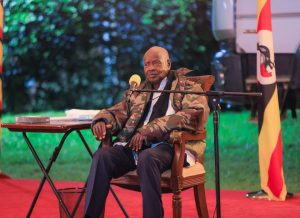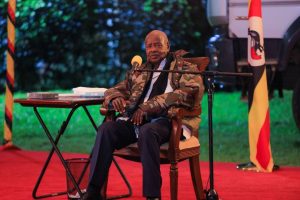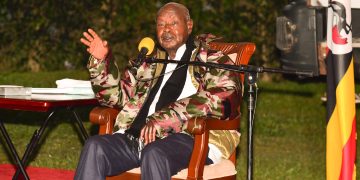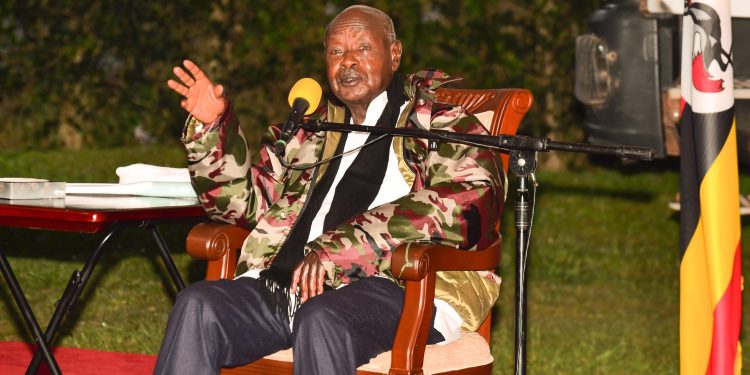Gulu — President Yoweri Kaguta Museveni, also the National Resistance Movement (NRM) presidential flag bearer, on Thursday evening held a live radio discussion with journalists from the Acholi Sub-region, focusing on Uganda’s progress in peace, democracy, unity, and economic transformation.
The interactive session, moderated by Mega FM’s James Obalo, took place at the Gulu State Lodge and featured questions from journalists on a wide range of national issues, including democracy, education, health, youth employment, and regional integration.
Mr Obalo began by congratulating President Museveni on the successful completion of his campaign trail in the Acholi Sub-region, noting that some NRM candidates had already secured parliamentary seats unopposed.
In his opening remarks, President Museveni thanked the media fraternity for their engagement and used the platform to reflect on Uganda’s democratic evolution and economic progress under NRM leadership.
“Uganda is the Most Democratic Country in the World”
On democracy, President Museveni said Uganda stands as a global example of “real democracy” rooted in people’s representation rather than theatrics.

“Uganda is the most democratic country in the world. This is real democracy — not theatre like you see in some other countries. Here, we present elections to the people, and we have Members of Parliament who truly represent the conscience of the population,” he said.
He noted that Uganda’s political system guarantees representation for all citizens — women, youth, workers, soldiers, the elderly, and persons with disabilities. “In 1962, there were only three women in Parliament out of 90 members. Today, we have affirmative action MPs from every district,” he observed.
Museveni added that Uganda’s democracy is anchored on directly elected leaders from the village to the district level. “We have very strong, directly elected leaders from the village, parish, sub-county, and district levels. Their duty is not to give handouts but to supervise government programs like the Parish Development Model (PDM) and ensure that funds reach the people,” he said.
Tackling Corruption and Strengthening Accountability
The President reminded listeners that the NRM’s fight against corruption began during the liberation struggle. “When we came from the bush, we found sub-county chiefs and corrupt government appointees. That’s why I insisted we elect our own leaders — and that’s how local councils were born,” he explained.
He said corruption persists when citizens fail to understand their role in safeguarding public resources. “The problem is that many people do not defend their money. Our fighters in the NRA were trained to prioritise. That’s what the population should learn — to focus on what truly matters,” Museveni added.

He illustrated this point with a personal anecdote from his early leadership years: “When I met Muammar Gaddafi in my 30s, he asked if I needed money, uniforms, or medicine. I told him, ‘No, I only want guns and bullets. If I have those, I will get the rest.’ That is what prioritisation means.”
Rural Growth and National Development
President Museveni emphasised that true economic transformation begins in the countryside. “When I was mobilising villagers in 1967, Rushere was just a small trading centre. Today, it’s a big town with shops, agricultural inputs, and many businesses. It is the countryside that creates towns,” he said.
He urged leaders to focus on improving rural infrastructure and empowering farmers for organic, sustainable growth.
On Opposition and Constitutional Discipline
When asked about Uganda’s political opposition, President Museveni said the country needs a stronger constitutional framework to protect national interests.
“We have a weak constitutional order. Some leaders should be disqualified for taking positions that endanger the country, like encouraging people to occupy wetlands or preaching tribalism. That person becomes an enemy of the nation,” he said.
He cited Tanzania as an example of a country with stricter laws, but noted that the NRM’s popularity stems from discipline and focus. “Reactionary groups tried to mislead people in the North, but we defeated them because of correct policies and consistency,” he said.
Economic Transformation and Job Creation
President Museveni outlined Uganda’s economic growth trajectory since 1986, noting that the economy has expanded 17-fold over four decades. “Uganda’s GDP has grown from $6 billion by the foreign exchange method to 17 times that size,” he revealed.

He outlined five key phases of economic growth — Minimum Recovery, Expansion of the Colonial Economy, Diversification, Value Addition, and the ongoing Knowledge Economy — saying Uganda is now positioned to transition into high middle-income status.
Museveni urged youth to pursue wealth creation rather than depend on government jobs. “Government jobs are only about 480,000. But factory jobs alone now employ 1.3 million people — almost three times the number of government workers,” he said. “Seek the wealth in homesteads, and all other things shall be added unto you.”
Health, Security, and Responsible Resource Use
On health, President Museveni attributed Uganda’s rising life expectancy — now 68 years, up from 43 years in 1986 — to immunisation and public health efforts, but urged doctors to emphasise prevention. “Many people are dying of preventable diseases like high blood pressure. If we emphasised prevention, we would eliminate 85% of sicknesses,” he said.
He also noted that the government is studying options for an affordable health insurance system that benefits ordinary citizens.
On security, he assured Ugandans that rebel groups like ADF and Al-Shabaab have been effectively defeated. “They cannot do much for Uganda anymore. We defeated them here, in Somalia, and in Congo,” he said.
Regarding natural resources, Museveni emphasised responsible management of oil and minerals, promising not to misuse proceeds. “Agriculture is renewable if we protect the environment, but minerals are not. When we get oil money, we shall use it to build power stations, railways, and factories — not to buy perfumes, whiskey, or wigs,” he asserted.
He concluded by clarifying Uganda’s tax policy, saying it is structured to promote production and discourage waste. “We tax luxury imports like vehicles and whisky, but not machinery or agricultural products. Our taxes are deliberate — to encourage production,” he said.









